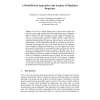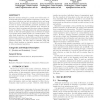753 search results - page 70 / 151 » Fragments-based Model Reduction: Some Case Studies |
CBSE
2009
Springer
14 years 3 months ago
2009
Springer
To build highly available or reliable applications out of unreliable third-party components, some software-implemented fault-tolerant mechanisms are introduced to gracefully deal w...
ECMDAFA
2009
Springer
14 years 3 months ago
2009
Springer
The need for a design language that is rigorous but accessible and intuitive is often at odds with the formal and mathematical nature of languages used for analysis. UML and Petri ...
HT
2009
ACM
14 years 3 months ago
2009
ACM
Narrative systems attempt to present users with media collections that include some element of structure or story, however these collections can lack an authorial voice and seem b...
WISES
2003
13 years 10 months ago
2003
— This paper is about collision avoidance of crowd robots. For this purpose a model of potential field is proposed. This potential field, generated by a neural network, is uniq...
CORR
2007
Springer
13 years 9 months ago
2007
Springer
A virtual plague is a process in which a behavior-affecting property spreads among characters in a Massively Multiplayer Online Game (MMOG). The MMOG individuals constitute a synt...


